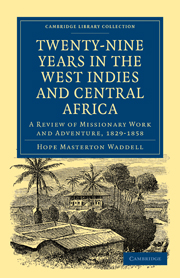 Twenty-Nine Years in the West Indies and Central Africa
Twenty-Nine Years in the West Indies and Central Africa Book contents
- Frontmatter
- Preface
- Contents
- CHAPTER I 1829
- CHAPTER II 1830, 1831
- CHAPTER III 1832
- CHAPTER IV 1832, 1833
- CHAPTER V 1834, 1835
- CHAPTER VI 1836, 1837
- CHAPTER VII 1837, 1838
- CHAPTER VIII 1838-1840
- CHAPTER IX 1841-1844
- CHAPTER X 1841-1845
- CHAPTER XI 1845
- CHAPTER XII 1846
- CHAPTER XIII 1846
- CHAPTER XIV 1846
- CHAPTER XV 1846, 1847
- CHAPTER XVI 1847
- CHAPTER XVII 1847
- CHAPTER XVIII 1847
- CHAPTER XIX 1847, 1848
- CHAPTER XX 1848, 1849
- CHAPTER XXI 1850
- CHAPTER XXII 1850
- CHAPTER XXIII 1850
- CHAPTER XXIV 1851
- CHAPTER XXV 1851
- CHAPTER XXVI 1852
- CHAPTER XXVII 1852
- CHAPTER XXVIII 1853, 1854
- CHAPTER XXIX 1855
- CHAPTER XXX 1856
- CHAPTER XXXI 1857
- CHAPTER XXXII 1858
- CHAPTER XXXIII 1858
- APPENDIX
- Plate section
CHAPTER XXVI - 1852
Published online by Cambridge University Press: 07 September 2011
- Frontmatter
- Preface
- Contents
- CHAPTER I 1829
- CHAPTER II 1830, 1831
- CHAPTER III 1832
- CHAPTER IV 1832, 1833
- CHAPTER V 1834, 1835
- CHAPTER VI 1836, 1837
- CHAPTER VII 1837, 1838
- CHAPTER VIII 1838-1840
- CHAPTER IX 1841-1844
- CHAPTER X 1841-1845
- CHAPTER XI 1845
- CHAPTER XII 1846
- CHAPTER XIII 1846
- CHAPTER XIV 1846
- CHAPTER XV 1846, 1847
- CHAPTER XVI 1847
- CHAPTER XVII 1847
- CHAPTER XVIII 1847
- CHAPTER XIX 1847, 1848
- CHAPTER XX 1848, 1849
- CHAPTER XXI 1850
- CHAPTER XXII 1850
- CHAPTER XXIII 1850
- CHAPTER XXIV 1851
- CHAPTER XXV 1851
- CHAPTER XXVI 1852
- CHAPTER XXVII 1852
- CHAPTER XXVIII 1853, 1854
- CHAPTER XXIX 1855
- CHAPTER XXX 1856
- CHAPTER XXXI 1857
- CHAPTER XXXII 1858
- CHAPTER XXXIII 1858
- APPENDIX
- Plate section
Summary
In the beginning of February 1852, King Archibong of Duke Town died, and the association of “blood men” again appeared. During his illness, the brethren there, Mr. Goldie and Mr. Anderson, visited him with the word of the Lord; but he heard it with apathy—his recovery engrossing his whole attention. The means used for this object were, indeed, in the eyes of reason, little adapted to promote it; but they were all that native skill could suggest. The putrifying bodies of fowl and goats, in different parts of his premises, poisoned the atmosphere. He owned at length that they were useless; and in answer to the missionary's admonitions about his soul, and trusting to Christ, had them removed.
His mother, Obúma by name, sometimes called Mrs. Archibong, from her prominence and influence, became still more distinguished at that time, and seemed to reign as queen of the town. Attributing his death, as usual, to witchcraft, she began to make his wives and others “chop nut;” and it was said also that she had broken the new law by the death of many slaves. Mr. Young, though taking part with her in administering the fatal test, most solemnly assured the missionaries that no one had in any way been put to death for the deceased King.
The town was soon filled with bands of armed men from the plantations, who came to avenge the death of their “father.”
- Type
- Chapter
- Information
- Twenty-Nine Years in the West Indies and Central AfricaA Review of Missionary Work and Adventure, 1829–1858, pp. 496 - 508Publisher: Cambridge University PressPrint publication year: 2010First published in: 1863
